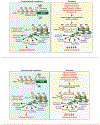Is Gcn4-induced autophagy the ultimate downstream mechanism by which hormesis extends yeast replicative lifespan?
- PMID: 30673825
- PMCID: PMC6511304
- DOI: 10.1007/s00294-019-00936-4
Is Gcn4-induced autophagy the ultimate downstream mechanism by which hormesis extends yeast replicative lifespan?
Abstract
The number of times a cell divides before irreversibly arresting is termed replicative lifespan. Despite discovery of many chemical, dietary and genetic interventions that extend replicative lifespan, usually first discovered in budding yeast and subsequently shown to apply to metazoans, there is still little understanding of the underlying molecular mechanisms involved. One unifying theme is that most, if not all, interventions that extend replicative lifespan induce "hormesis", where a little inflicted damage makes cells more able to resist similar challenges in the future. One of the many cellular changes that occur during hormesis is a global reduction in protein synthesis, which has been linked to enhanced longevity in many organisms. Our recent study in budding yeast found that it was not the reduction in protein synthesis per se, but rather the subsequent induction of the conserved Gcn4 transcriptional regulator and its ability to induce autophagy that was responsible for extending replicative lifespan. We propose that Gcn4-dependent induction of autophagy occurring downstream of reduced global protein synthesis may be a unifying molecular mechanism for many interventions that extend replicative lifespan.
Keywords: Aging; Autophagy; Gcn4; Hormesis; Yeast.
Figures

References
-
- Ables GP, and Johnson JE (2017). Pleiotropic responses to methionine restriction. Experimental gerontology 94, 83–88. - PubMed
-
- Castilho BA, Shanmugam R, Silva RC, Ramesh R, Himme BM, and Sattlegger E (2014). Keeping the eIF2 alpha kinase Gcn2 in check. Biochim Biophys Acta 1843, 1948–1968. - PubMed
-
- Deloche O, de la Cruz J, Kressler D, Doere M, and Linder P (2004). A membrane transport defect leads to a rapid attenuation of translation initiation in Saccharomyces cerevisiae. Mol Cell 13, 357–366. - PubMed
-
- Ghavidel A, Baxi K, Ignatchenko V, Prusinkiewicz M, Arnason TG, Kislinger T, Carvalho CE, and Harkness TA (2015). A Genome Scale Screen for Mutants with Delayed Exit from Mitosis: Ire1-Independent Induction of Autophagy Integrates ER Homeostasis into Mitotic Lifespan. PLoS genetics 11, e1005429. - PMC - PubMed
Publication types
MeSH terms
Substances
Grants and funding
LinkOut - more resources
Full Text Sources
Molecular Biology Databases

